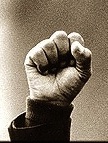 Like much of the planet’s population (if the media is to be believed) I have done a certain about of reflecting and even mourning over the past week or so. Of course I am glad that Nelson Mandela did not die in prison. But at the same time I cannot help feeling a certain nostalgia for that time when he was incarcerated on Robben Island — at least for that part of my life, the 1980s, when I’d become aware of him, his plight and the broader struggle he was part of.
Like much of the planet’s population (if the media is to be believed) I have done a certain about of reflecting and even mourning over the past week or so. Of course I am glad that Nelson Mandela did not die in prison. But at the same time I cannot help feeling a certain nostalgia for that time when he was incarcerated on Robben Island — at least for that part of my life, the 1980s, when I’d become aware of him, his plight and the broader struggle he was part of.
This is nostalgia for a period of my life, not his, and it’s nostalgia for a political constellation, of which Mandela was as much a comet as a force.
So this nostalgia is partly personal. I was a teenager in the 1980s. And teenage experiences — political, social, cultural — have a greater intensity. Much of the music, for example, that moved me in the 1980s moves me still, and moves me more than most music I’ve heard since.
And partly the nostalgia’s political. Things seemed clearer in the 1980s. The past week almost everyone (by which I really mean almost every politician and professional commentator) has been calling Mandela ‘Madiba’ (like they knew him personally and were his friend) and paying tribute (homage even) to his greatness. Politicians like David Cameron. Back in the 1980s Cameron was a member of the Federation of Conservative Students which produced ‘Hang Mandela’ posters and badges. The government of Cameron’s hero Margaret Thatcher labelled Mandela’s ANC ‘terrorist’ and opposed sanctions against apartheid South Africa. (In fact Thatcher’s husband Dennis had extensive business interests there.) Cameron himself visited the country in 1989, his expenses paid by an anti-sanctions lobbying group.
But this is about more than apartheid. The struggle against apartheid in countries like Britain was part of a wider set of movements against a nascent neoliberal project, whose success was far from guaranteed. The Special AKA’s ‘Free Nelson Mandela’ was released in 1984, just as the year-long British miners’ was starting. Three decades and countless defeats later, the neoliberals are winning and they’re trying — as victors always to do — to rewrite history and colonise memories. But I don’t remember Nelson Mandela as a ‘great man of history’, or as a representative of ‘universal’ human values. I mourn him as a militant freedom fighter (even if he wasn’t). I mourn him as a representative of the thousands of other militants in South Africa (and elsewhere) — militants I think of as his comrades — who died more anonymously and more violently. And I mourn a period of my life when an alternative future to the neoliberal present we currently inhabit seemed much more possible.

Comments Off on Mandela and nostalgia